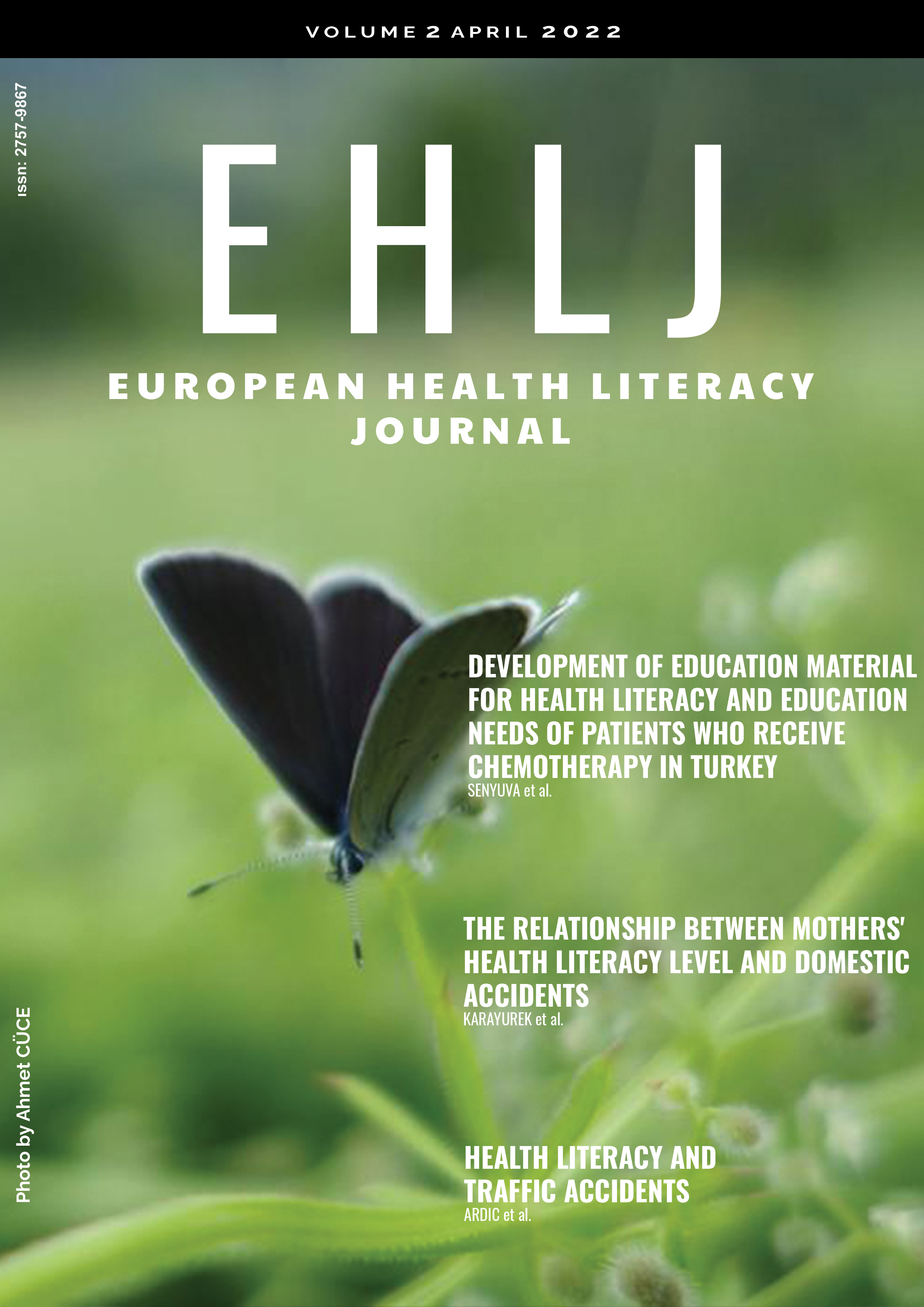Author :
Abstract
Keywords
Abstract
Aim: The aim of this study is to deconstruct the relationship between health literacy and traffic accidents.
Methods: This study was conducted with volunteers who came to the Family Health Center between February 2022 and April 2022. Volunteers were asked to fill in the sociodemographic data form, and the Latest Vital Signs Form (NVS).
Results: According to the results of our study, the NVS score was found to be lower in those who had a traffic accident. The NVS score of those who had a traffic accident was found to be lower at all levels of education compared to those who had not had a traffic accident. As the level of education increased, NVS scores increased.
Conclusions: At least one of the drivers is at fault in accidents that occur when two vehicles hit each other. It was observed that being involved in an accident in any way was associated with health literacy. The health literacy scale is a scale in which we evaluate the reading comprehension and attention ability of people with NVS. Considering that drivers who have a good attention span, a high NVS score, and drive more cautiously, the education of individuals with low health literacy in traffic accident prevention may be recommended.
Keywords
- 1. Ozaydin F, Demirci H, Karayurek Y. Relatıonship Between Occupational Accidents of Industrial Workers and Health Literacy and Workplace Safety Climate. Eur Health Liter J. 2021; 1: 47-57.
- 2. Sørensen K, Van den Broucke S, Fullam J, Doyle G, Pelikan J, Slonska Z et all. Health literacy and public health: A systematic review and integration of definitions and models. BMC Public Health. 2012; 12: 80.
- 3. Gözlü K. A Social Determinant Of Health: Health Literacy. Med J SDU. 2020; 27(1): 137
- 4. Andrus MR, Roth MT. Health literacy: a review. Pharmacotherapy: The Journal of Human Pharmacology and Drug Therapy. 2002; 22: 282-302.
- 5. Nutbeam D. Health Literacy as a public health goal: A challenge for contemporary health education and communication strategies into the 21st century. Health Promot Int. 2000;15:259-67.
- 6. Road traffic injuries - WHO | World Health Organization. https://www.who.int/newsroom/fact-sheets/detail/road-traffic-injuries. Access Date: 30.04.2022
- 7. 2020 yılı karayolları genel müdürlüğü sorumluluğundaki yol ağında meydana gelen trafik kazalarına ait özet bilgiler. Kara Yolları Müdürlüğü. https://www.kgm.gov.tr/SiteCollectionDocume nts/KGMdocuments/Trafik/TrafikKazalariOzeti2 020.pdf. Access Date: 30.04.2022
- 8. Gökdağ M, Atalay A. Trafik Eğitiminin Trafik Kazaları Üzerindeki Etkisi. Erzincan Univ J Sci Tech. 2015; 8: 272-83.
- 9. Kuyumcu Z, Aslan H, Yose M, Ahadi S. Türkiye’de Trafik Kazaları ve Sürücülerin Kazalardaki Payı. Academic Perspect Procedia. 2020; 3: 694-702.
- 10. Weiss BD, Palmer R. Relationship between health care costs and very low literacy skills in a medically needy and indigent Medicaid population. J Am Board Fam Pract. 2004;17:44-7.
- 11. Çiftçi F, Demirci H, Çiftçi HN, Ocakoğlu G. Validation of Turkish Version of Newest Vital Sign Scale to Assess Health Literacy. Bezmialem Sci. 2021; 9: 219-25
- 12. Ülke Geneli. Trafik. http://trafik.gov.tr/kurumlar/trafik.gov.tr/04Istatistik/Aylik/aralik21.pdf Access Date: 30.04.2022
- 13. Sümer N, Özkan T. Sürücü Davranişlari, Becerileri, Bazi Kişilik Özellikleri ve Psikolojik Berlirtilerin Trafik Kazalarindaki Rolleri [The role of driver behavior, skills, and personality traits in traffic accidents]. Turk Psikol Derg. 2002; 17: 1–25.
- 14. Sargent-Cox KA, Windsor T, Walker J, Anstey KJ. Health literacy of older drivers and the importance of health experience for selfregulation of driving behaviour. Accid Anal Prev. 2011; 43: 898-905.
- 15. Buck D, Godfrey C, Morgan A. The contribution of health promotion tomeeting health targets: questions of measurement, attribution and responsibility. Health Promot Int. 1997; 12: 239–50.
- 16. Wardle J, Parmenter K, Waller J. Nutrition knowledge and food intake. Appetite. 2000; 34: 269–75.
- 17. Pelikan JM, Röthlin F, Ganahl K. The European Health Literacy Project, 2009-2012. Ludwig Boltzmann Institut. 2012.
- 18. Nutbeam, D. Health education and health promotion revisited. Health Educ J. 2019; 78: 705-9.
- 19. Vamos S, Okan O, Sentell T, Rootman I. Making a case for “Education for Health Literacy”: an international perspective. Int J Environ Res Public Health. 2020; 17: 1436.
- 20. Tanrıöver MD, Yıldırım HH, Ready FND, Çakır B, Akalın HE. Sağlık Okuryazarlığı Araştırması. Sağlık-Sen Yayınları. 2014; 6: 42-47.





